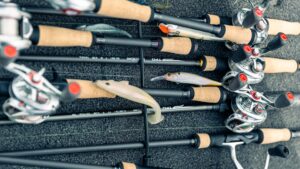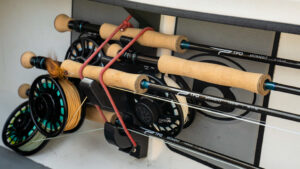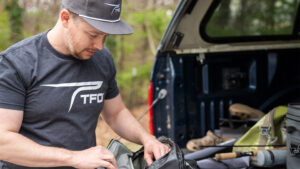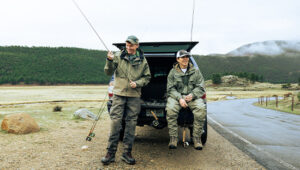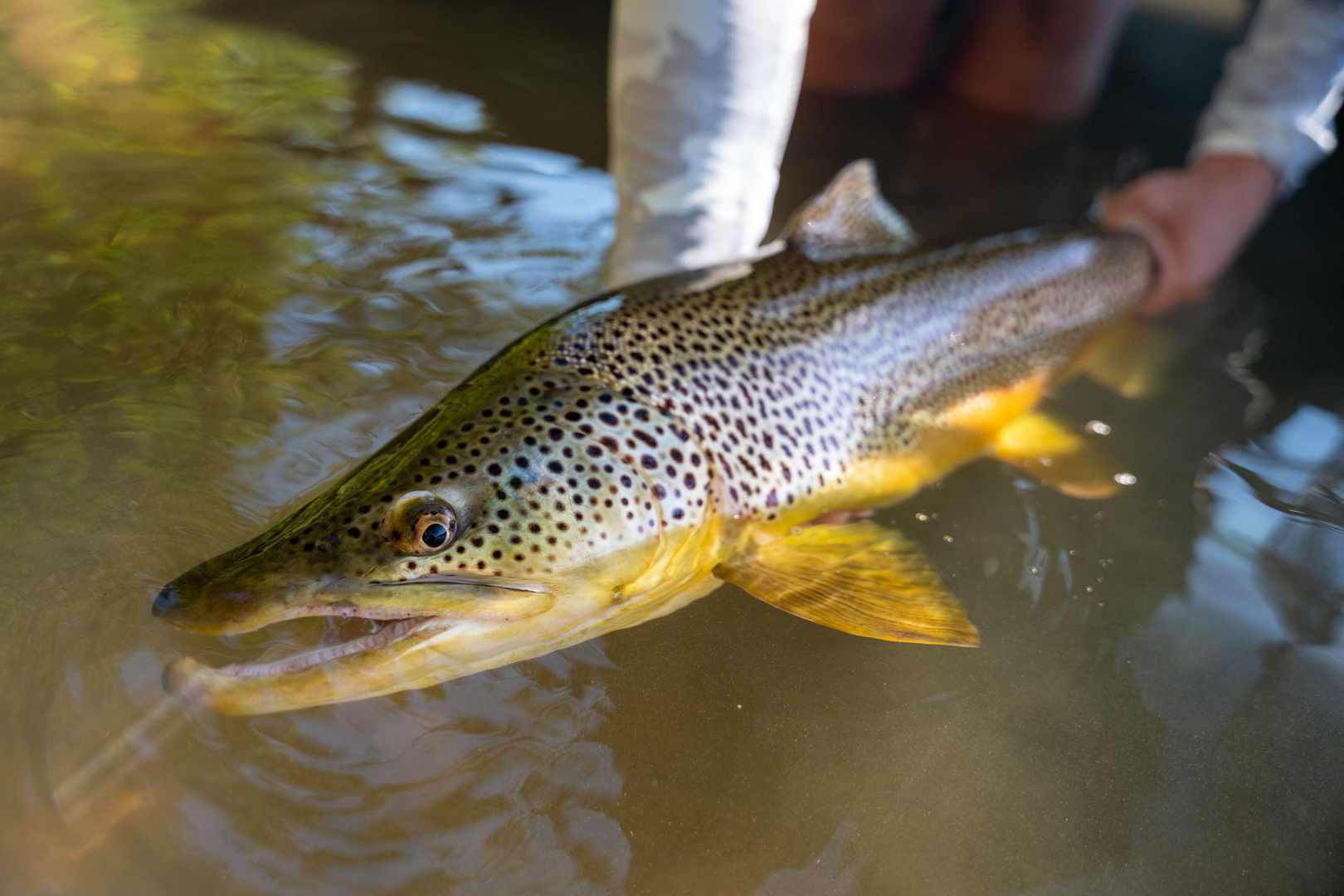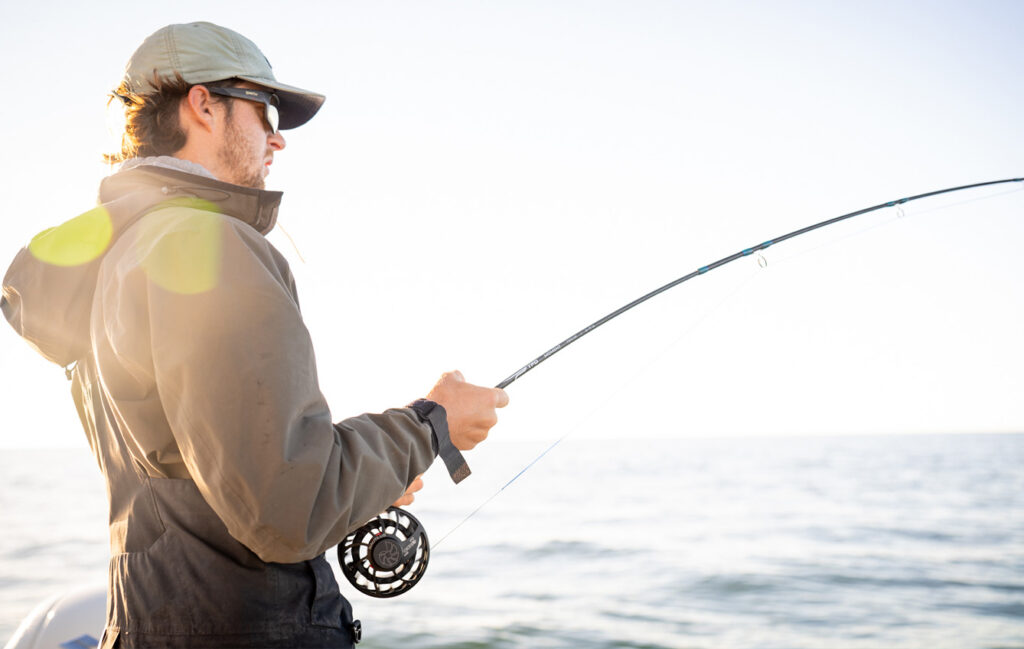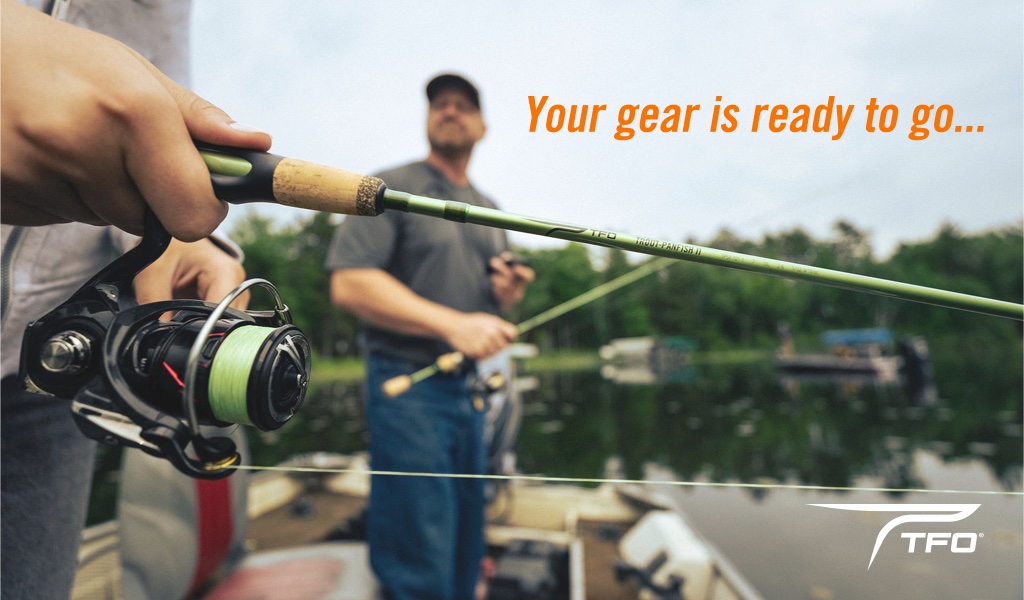“Can you hear me?” calls an Australian accent from behind me as another White River jon boat comes roaring past us at 8am.
I quickly picked up my SA Bass Bug fly line and shoot another cast to the outside seam of a run that rides adjacent to a bank filled with overhanging trees, boulders, and moss beds – the perfect place for a brown trout to hang out. My fly lands a little short of the white bubble line of the run.
“You really like that spot, don’t ya mate?”
I shake my head, smile, and look back at my guide, Steve Dally of Dally’s Ozark Fly Fisher. As we continue to float parallel to the bank, we begin to approach a rock ledge sticking out from the bank, forming a shallow gravel bed about 10 feet in front of the point.

Steve Dally of Dally Ozark Fly Fisher making diligent hopper decisions. // Photo: Tom Wetherington
“Cast there, mate.” instructs Dally. I make a long cast with my 6wt LK Legacy in front of the boat to the point, and the large black foam hopper patterns makes a loud splat, followed by a ripple of rings from the impact in the crystal-clear water.
The hopper floats for a few seconds, then a very subtle brown trout nose rises and slurps the fly. The fish goes down, I wait for what felt like a lifetime (2 seconds), then raise my rod tip to set the hook. The fish shakes, and the fly pops out.
I look back at Steve, whose tense, shocked facial expression resembles someone who just dropped a very expensive, fragile antique vase. “Did you see that head? That was a 20+ incher, mate.”

The beautiful White River in Cotter, Arkansas. // Photo: Tom Wetherington
It’s late August, and I’m on my bachelor party fishing trip fishing the White River for three days with my older brothers. Prior to the booking of this trip, my knowledge of the White River was that this river was a winter fishery, and the name of the game was big water (flows), big streamers on heaving sinking lines, and monster brown trout. I was way off – sort of.
Summer brings longer sunny days, but it also brings out terrestrials. Grasshoppers, beetles, ants, cicadas, and other big bugs fall or get blown into the river from the banks and overhanging trees. While not a consistent “hatch”, the bugs are there, and the sporadic rise or splash on the surface are proof the fish are noticing.

Fat Alberts For Days. A few of many patterns you can find at Dally’s Ozark Fly Fisher. // Photo: Tom Wetherington
Fishing hoppers on the White River is quite a bit different than the terrestrial fishing I’m used to doing back home on small streams in the Great Smoky Mountain National Park with small beetles and ant patterns. It is, however, very similar to fishing topwater flies for smallmouth bass while floating from a drift boat.
As with the case of that missed brown trout, much like when a smallmouth bass eats a topwater bug, the waiting game for the fish to have a chance to eat your bug can be tough (and painful) to figure out. Setting the hook too soon can result in a missed fish but waiting too long can give the fish a chance to realize what is really in his mouth.

Brown trout hopper breakfast. // Photo: Tom Wetherington
Long casts in front of the boat were crucial to keep from spooking fish. Targeting current lines as close as possible to the bank was the target, however, drop offs/changes in depths, ledges, and flooded grass patches also brought out some nice fish throughout the weekend.

Hopper placement is key when fishing for trout on the White River. // Photo: Tom Wetherington
The rest of my day with Steve was tough – not his fault by any means. The lower-than-normal flows and high volume of boat traffic made it challenging to find fish. However, at the end of the day, I was able to connect with a nice 18-inch brown and several rainbows on hoppers. Throughout the day, Steve gave me great advice for line control, as well as where to look for those fish, which absolutely paid off over the next few days.

Nothing but net and admiration for a beautiful brown trout. // Photo: Tom Wetherington
The next day, I fished with guide Michael Saladin (whom my brothers fished with the day prior), and my brothers teamed up to fish with Dally. I knew I liked Michael right away when I saw he had four Blue Ribbon rods and BVK SD reel setups in the rod racks, and this was before he knew I was social media manager for TFO.
We met Steve and Michael at the Cotter Bridge boat ramp at 7am, only to find about 20 other White River jon boats that had the same plan as us. Frustrated by the amount of traffic and pressure that stretch of the river was about to get, we decided to head upriver to another ramp, which surprisingly only had two other boats.
Michael and I worked our way downstream focusing on a morning sun lit river right, while Steve and my brothers focused on the shaded river left. I was able to convince a nice 18” brown to eat a brown foam hopper pattern that Michael had tied that morning out of a nice choppy run next to a long gravel bar.

TFO gear ready to go on a White River jon boat. // Photo: Tom Wetherington
“I had a feeling this fly would work. Super buggy.” said Michael.
Steve and my brothers decided to head up stream to find some new water, and Michael and I continued downstream. Just below the gravel bar where that last fish was caught, there was a long stretch of water that had just enough current to get a perfect drag free drift. We came upon an overhanging tree with some structure underneath that was just too perfect not to cast to.
I made a long cast underneath the tree, and not long after the fly landed, a large brown trout mouth broke the surface and crushed the hopper like a freight train. In addition to its explosive attack on the surface, we saw the white flash of the fish’s mouth, and knew this was a much bigger fish.

Photo: Tom Wetherington
The fish immediately took off down river, making my NTR II reel sing and putting a nice bend in to my 6wt LK Legacy. To try to keep the fish from running too far downstream to a nearby shoal and drop off, I increased the drag a little bit on my NTR, while trying to carefully reel in as much line as I could, but with just enough pressure to let the fish run when needed. With 3x tippet on, the last thing we wanted to do was lose the fish.
I couldn’t help but think the fish was fighting a lot like a common carp on the fly. Similar to carp, the large brown trout stayed close to the bottom, and made several hard pulling runs downstream. Once I put drag on, and started to work the fish on the reel, I was able to keep the fish closer to the boat, but like carp, once the fish got close to the boat, it decided to take off again.
After about five minutes, I was able to get the fish close enough to the boat, and Michael was able to net the beast. I wish I had a camera to record the netting, but I’m pretty sure everyone in Cotter, Arkansas heard Michael and I yell in excitement. We anchored up on the bank to measure the fish in at 28 inches, snap a few photos, and let him go.

Photo: Tom Wetherington

Photo: Tom Wetherington

Photo: Tom Wetherington
The rest of the day and my trip on the White was all gravy from there. Several more browns in the 20+ inch range were caught on hoppers, along with a bunch of smaller rainbows, but nothing topped that fish.
While most bachelor parties are remembered (or not remembered) as long nights of drinking and bar hopping in large cities like Vegas, I will always remember how I spent mine in Cotter, Arkansas with my brothers and the guides at Dally Ozark Fly Fisher.
Blogs and photos by Tom Wetherington.

![]()
